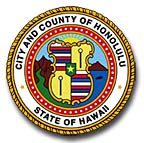City councilman, on a proposal to raise the general excise tax
City measure
touts rail tax
The bill comes a day after the
Legislature provided counties
with the authority
Charter schools say funding inadequate
Lingle not sold on wage increase
Bills expand laws on sex offenders, DNA
What passed, what didn't
The City Council wasted no time in introducing a bill that would raise the general excise tax on Oahu up to 4.5 percent to build a rail transit system.
 The bill came one day after the state Legislature passed a bill granting counties the authority to enact a tax surcharge of one-half percentage point to fund rail transit on Oahu and other transportation projects on the neighbor islands. The state bill is now before Gov. Linda Lingle.
The bill came one day after the state Legislature passed a bill granting counties the authority to enact a tax surcharge of one-half percentage point to fund rail transit on Oahu and other transportation projects on the neighbor islands. The state bill is now before Gov. Linda Lingle.
"We are anxious after what had occurred back in 1992 to follow through on unfinished business," said Councilman Nestor Garcia, chairman of the Planning and Transportation Committee, who introduced the bill along with six other Council members.
In 1992 the City Council voted 5-4 to reject raising taxes to fund a rail transit system.
"This is the final step. This is where it's going to be make or break. This is going to be 1992 all over again," said Councilman Gary Okino, who also signed the bill and who along with Garcia said he would support the tax hike to fund rail.
The Council will take the first of three votes on the bill Wednesday, and those on both sides of the controversy are expected to lobby the Council hard.
"I think politicians have to have the courage to do what's right for the sake of the island of Oahu. We've got to take the heat and pass this thing," Okino said.
Councilman Charles Djou, who along with Councilwoman Barbara Marshall did not sign the bill, opposes raising the tax.
"This is a massive tax increase," said Djou. "This is far too much more than the people can afford."
Lingle said yesterday morning that she had not yet read the bill passed by the state Legislature.
"My understanding of it is that it gives an option to the counties, and that's something I've supported from the beginning," she said. "The citizens who feel there shouldn't be a tax increase are going to have to go to the Councils in their particular counties and talk with them about it now."
The state Tax Department voiced concerned during the legislative session about having to administer the half-percent surcharge. Lingle said while the state would have preferred that the counties administer the tax, "it's probably not going to cause me to veto the bill."
Garcia said the decision to introduce the bill so quickly after the Legislature's approval was done to meet the Dec. 31 deadline by when each County Council must vote to raise the tax.
A bill takes a minimum of three months to pass out of the Council with three Council votes and two committee hearings.
Garcia also said that the second vote on the bill will not come until July 6, around the time of Lingle's veto deadline.
The tax would be levied beginning Jan. 1, 2007, and is expected to bring in about $150 million annually. The state will take 10 percent of the amount collected for administering the tax.
"It's a half-percent more than we had before, and we're going to build the best system that we can," Garcia said.
The bill mimics the state legislation, which allows for the funding to be spent on operating or capital costs of a "locally preferred alternative for a mass transit project." The surcharge would be repealed in 2022.
Garcia said the bill also sends a signal to Hawaii's congressional delegation that the Council is serious about moving forward with rail transit as Congress decides on transportation funding. Hawaii's members in Congress have been reluctant to assist in rail funding since 1992 when more than $600 million in federal financing was lost due to the Council vote.
Council Budget Chairwoman Ann Kobayashi said the new taxing authority is an opportunity to seek relief from traffic congestion with plans calling for the rail line to start in Kapolei and eventually end up at the University of Hawaii in Manoa.
www.co.honolulu.hi.us/council/index1.htm
[News] [Business] [Features] [Sports] [Editorial] [Do It Electric!]
[Classified Ads] [Search] [Subscribe] [Info] [Letter to Editor]
[Feedback]
